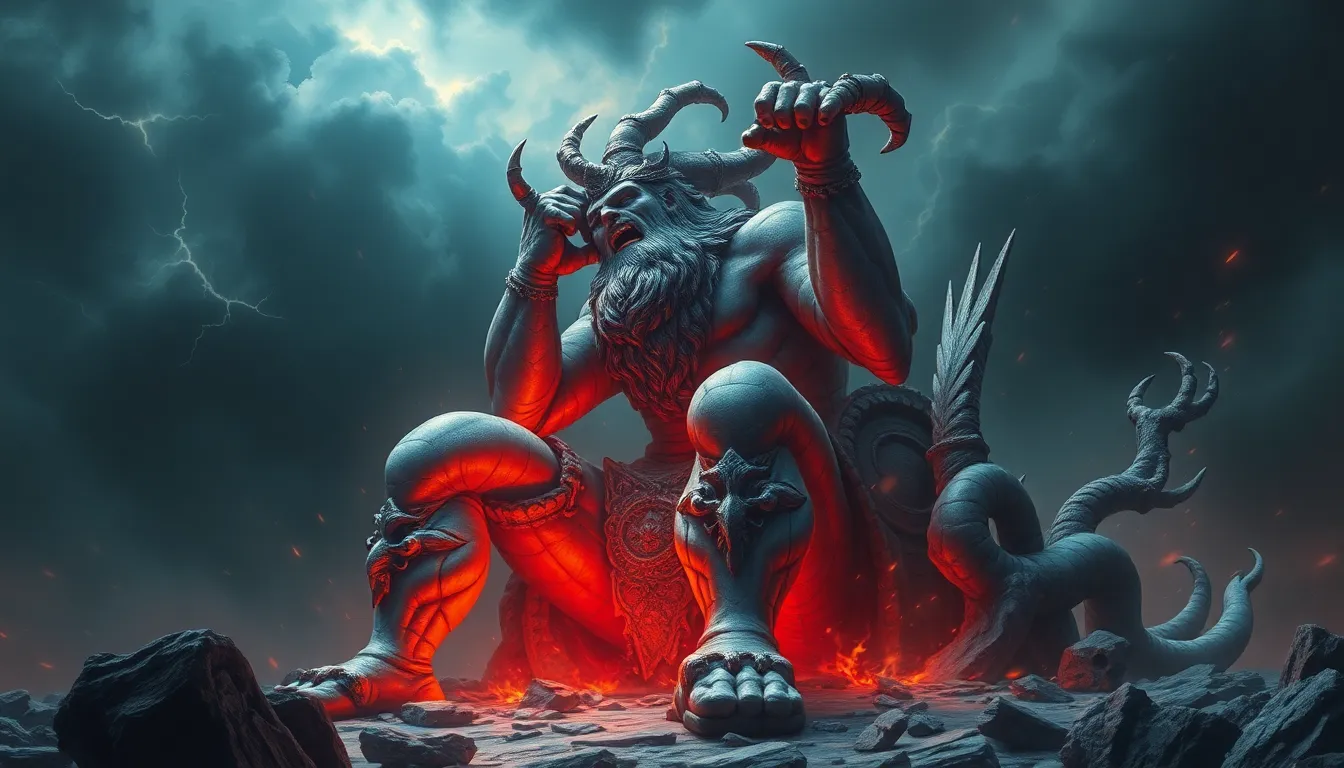The Tragic Downfall of Cronus: A Titan’s Tale
I. Introduction
Cronus, one of the most significant figures in Greek mythology, stands as a symbol of both power and tragedy. As the leader of the Titans, he played a pivotal role in the mythological hierarchy that shaped ancient Greek beliefs. This article aims to explore the life of Cronus, from his rise to power to his eventual downfall, shedding light on the intricate dynamics of the Titans and the Olympians.
II. The Rise of Cronus
To understand Cronus’ ascent, it is essential to grasp the background of the Titans and the primordial gods. The Titans, descendants of the primordial deities Gaia (Earth) and Uranus (Sky), were powerful beings who ruled during the Golden Age.
A. Background of the Titans and the Primordial Gods
The Titans embodied various aspects of the natural world and human experience. They were strong, wise, and often depicted as personifications of cosmic forces.
B. Cronus’ Ascension to Power
Cronus rose to power through a series of dramatic events:
- The Overthrow of Uranus: Cronus, urged by his mother Gaia, castrated his father Uranus with a sickle, thus ending his tyrannical rule and liberating the Cyclopes and Hecatoncheires, who Uranus had imprisoned.
- Establishment of His Rule Over the Cosmos: Following his victory, Cronus became the ruler of the universe, ushering in a new age characterized by stability and prosperity.
III. Cronus as a Ruler
As the leader of the Titans, Cronus presided over a realm of abundance. However, his reign was marked by significant challenges and personal fears.
A. Cronus’ Reign and Its Characteristics
Cronus’ rule was often seen as a time of peace, but it was also filled with underlying tension, particularly due to the prophecy that foretold his downfall.
B. His Relationship with the Other Titans
Cronus maintained a close alliance with his Titan siblings, but his paranoia about losing power strained these relationships. His interactions were often characterized by fear and suspicion.
C. The Prophecy That Loomed Over Him
A chilling prophecy foretold that one of Cronus’ children would overthrow him, leading to his increasingly tyrannical behavior as he sought to prevent this fate from coming to pass.
IV. The Birth of the Olympians
Cronus married his sister Rhea, and together they had several children. However, the fear of being overthrown drove Cronus to drastic actions.
A. Cronus’ Marriage to Rhea
Their union was one of both love and tension, as Rhea was aware of Cronus’ dark deeds and the fate awaiting their offspring.
B. The Birth of His Children: Hestia, Demeter, Hera, Hades, and Poseidon
Cronus and Rhea’s children were significant figures in mythology, yet Cronus, fearing the prophecy, took extreme measures:
- Hestia
- Demeter
- Hera
- Hades
- Poseidon
C. The Fear of Being Overthrown: Cronus’ Drastic Actions
In a desperate attempt to thwart the prophecy, Cronus swallowed each of his children at birth, believing he could eliminate the threat they posed.
V. The Downfall Begins
The cycle of fear and betrayal continued as Rhea plotted to save her youngest child, Zeus.
A. Rhea’s Rebellion Against Cronus
In a courageous act, Rhea concealed Zeus from Cronus, hiding him in a cave on the island of Crete. Instead, she gave Cronus a stone wrapped in swaddling clothes, which he unwittingly swallowed.
B. The Saving of Zeus
Zeus grew up in secrecy, nurtured by the nurturing spirits of the island, and prepared to reclaim his rightful place.
C. Cronus’ Attempts to Maintain Control
As Zeus matured, Cronus sensed a shift in the balance of power, prompting him to tighten his grip over the cosmos, leading to inevitable conflict.
VI. The Titanomachy: Clash of Titans and Olympians
The stage was set for a monumental clash between the Titans and the Olympians, known as the Titanomachy.
A. The Buildup to the War Between Titans and Olympians
Zeus, rallying his siblings and allies, prepared for war against Cronus and the Titans, fueled by the desire for freedom and justice.
B. Key Battles and Strategies Employed by Both Sides
The war was fierce, with both sides employing cunning strategies and displays of power. The Titans, strong and numerous, clashed with the newly empowered Olympians.
C. The Role of Zeus in Rallying the Olympians
Zeus emerged as a formidable leader, inspiring the Olympians with his vision of a new order and utilizing the strength of the Cyclopes to forge powerful weapons.
VII. The Aftermath of Defeat
The Titanomachy concluded with a decisive victory for the Olympians, leading to the downfall of Cronus.
A. The Fate of Cronus Post-Titanomachy
After his defeat, Cronus faced a grim fate. Zeus and the Olympians imprisoned him in Tartarus, a deep abyss used as a dungeon of torment.
B. The Imprisonment in Tartarus
Cronus’ imprisonment served as a symbol of the new order established by Zeus and the Olympians, who sought to ensure that the cycle of tyranny would not repeat.
C. Reflections on the Consequences of His Actions
Cronus’ actions, driven by fear and ambition, ultimately led to his downfall, illustrating the inevitable consequences of tyranny and betrayal.
VIII. Conclusion
The legacy of Cronus in myth and culture is profound, embodying themes of power, fear, and familial betrayal. His tragic tale serves as a cautionary reminder of the dangers of unchecked ambition and the complexities of familial relationships.
In the end, Cronus remains a poignant figure in Greek mythology, representing the cyclical nature of power and the tragic consequences that often accompany the quest for dominance.




